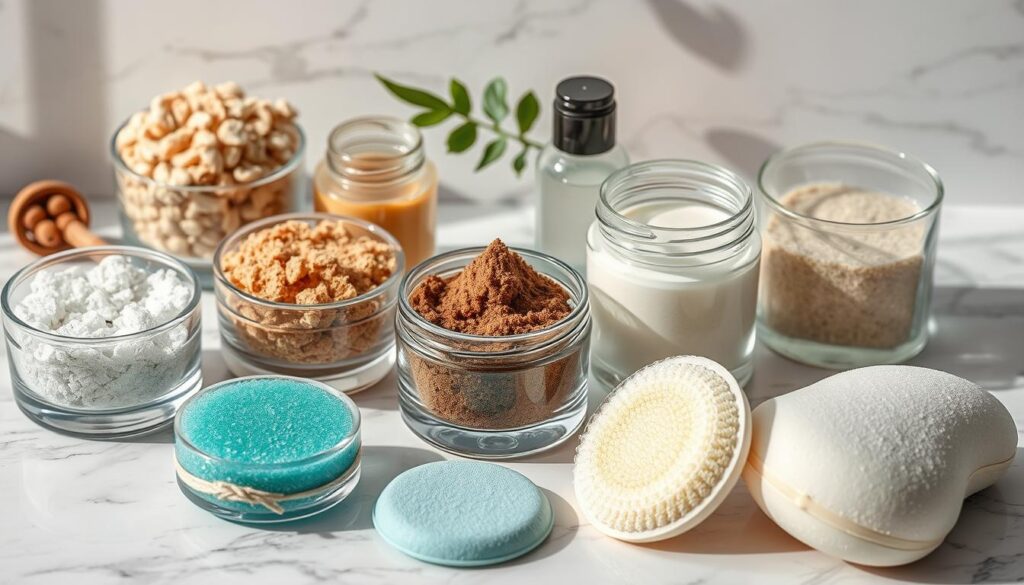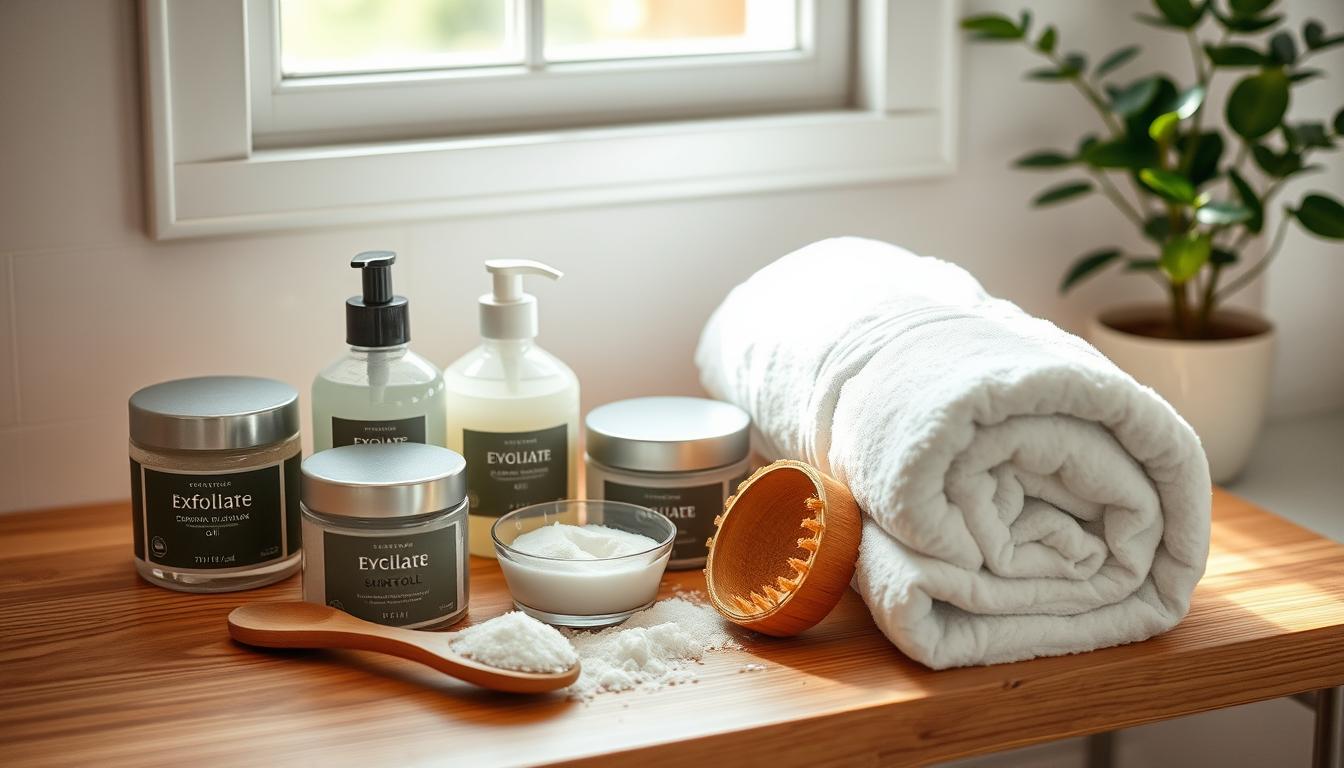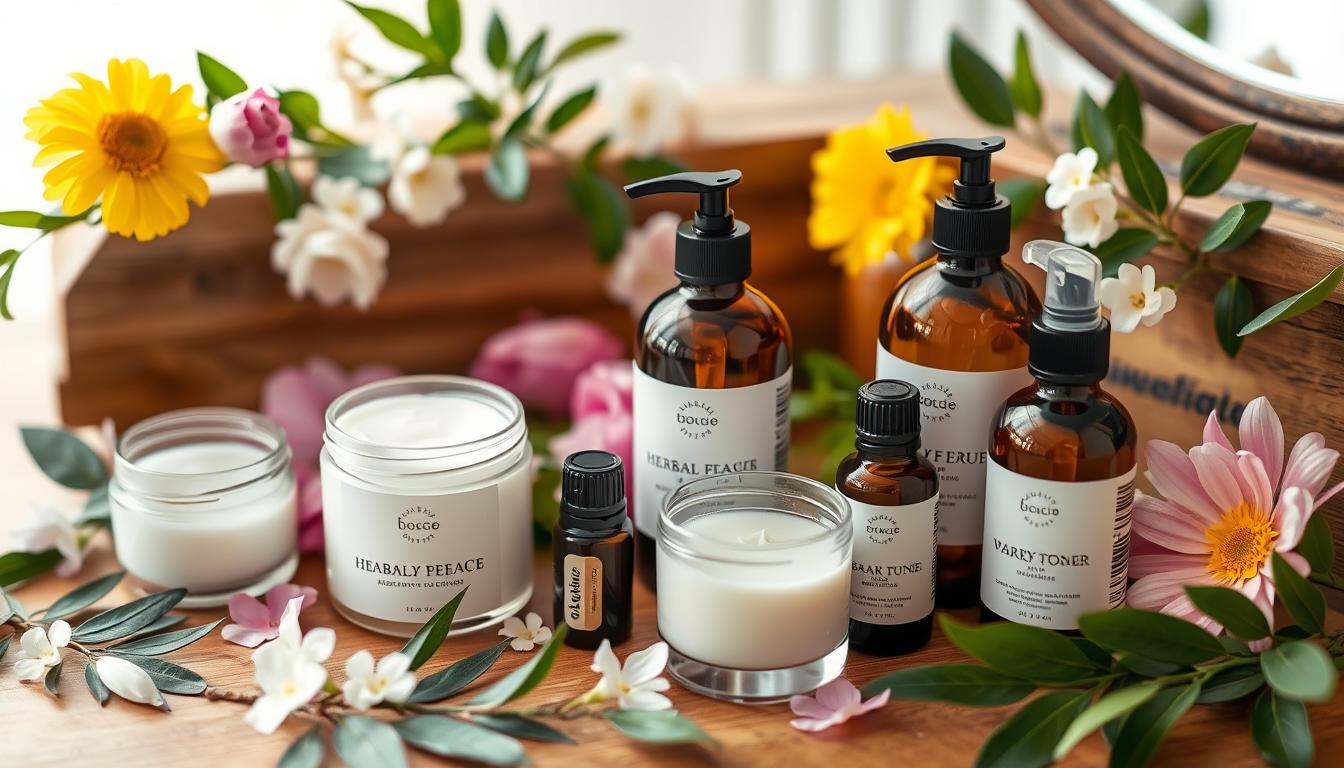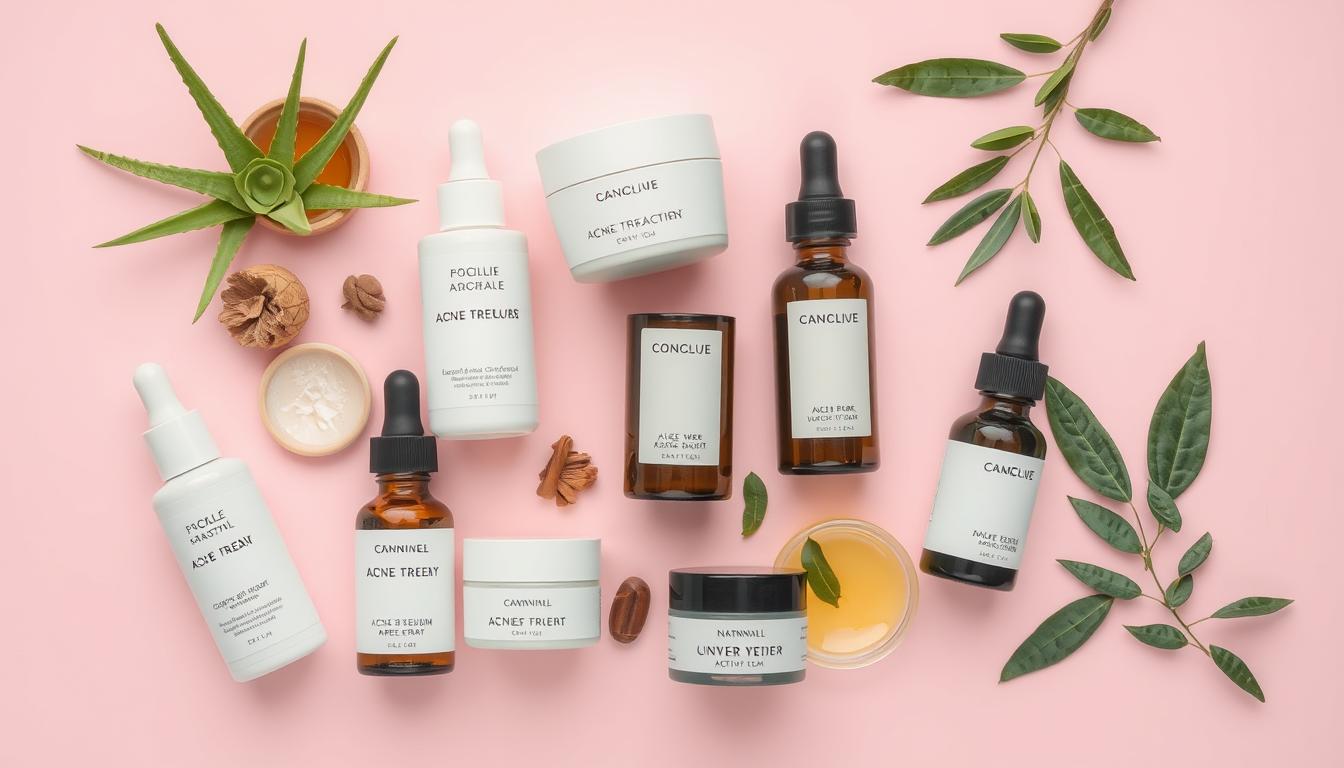Unlock the secrets to radiant, youthful-looking skin with exfoliation. This essential skincare step reveals a brighter, smoother complexion. It sheds away dull cells, letting fresh, healthy skin shine.
Looking for a glowing complexion or to minimize pores? Exfoliation can help. It combats signs of aging, making your skin look and feel better.
Key Takeaways
- Exfoliation removes dead skin cells, promoting skin cell renewal for a brighter, more radiant complexion.
- Regular exfoliation enhances the absorption of skincare products, maximizing their effectiveness.
- Exfoliation can help minimize the appearance of pores and improve overall skin texture.
- Incorporating exfoliation into your routine can combat signs of aging by reducing fine lines and wrinkles.
- Choosing the right exfoliant, whether natural or chemical, can address specific skin concerns like acne.
Understanding Exfoliation: What Is It?
Exfoliation is key to getting healthy, glowing skin. It removes dead skin cells, making your skin look smoother and more even. Learning about exfoliation can help you improve your skin’s texture and look younger.
Definition of Exfoliation
Exfoliation means removing the top layer of your skin, called the stratum corneum. This layer gets clogged with dead skin cells, making your skin look dull and uneven. By getting rid of these cells, exfoliation helps your skin look better and feel fresher.
Types of Exfoliation
There are two main ways to exfoliate: physical and chemical. Physical exfoliation uses rough materials like scrubs to remove dead skin cells. Chemical exfoliation uses acids or enzymes to break down these cells, making them easy to remove.
- Physical Exfoliation: Uses brushing, scrubbing, or dry brushing to remove dead skin cells.
- Chemical Exfoliation: Uses alpha-hydroxy acids (AHAs), beta-hydroxy acids (BHAs), or enzymes to dissolve dead skin cells.
Both methods can improve your skin’s texture and remove dead cells. But, it’s important to pick the right one for your skin type and concerns.

Why Exfoliation Is Important for Skin Health
Exfoliation is a key part of any good skincare routine. It offers many benefits for your skin’s health and look. It helps remove dead skin cells and boosts skin renewal. This makes your skin look better and helps other skincare products work better.
Removes Dead Skin Cells
As we get older, our skin’s natural exfoliation slows down. This leads to a buildup of dead skin cells. Exfoliation gets rid of these cells, showing off the fresh skin underneath. It makes your skin feel smoother and helps prevent breakouts.
Promotes Skin Renewal
Exfoliation speeds up the skin’s cell turnover. This means more new, healthy skin cells are made. It helps reduce fine lines and wrinkles, making your skin look clearer and brighter.
Enhances Absorption of Skincare Products
Exfoliation lets your skincare products reach deeper into your skin. This means they work better, whether you’re using moisturizers, serums, or treatments. It helps increase product absorption and unclog pores.
“Exfoliation is the key to unlocking your skin’s true radiance and revealing its full potential.”
Adding regular exfoliation to your skincare routine is crucial. It removes dead cells, boosts renewal, and makes products work better. This helps you achieve a glowing, youthful look.
The Various Benefits of Exfoliation
Exfoliation is a key part of your skincare routine. It offers many benefits that can change how your skin looks and feels. It can make your skin smoother and brighter.
Improved Skin Texture
Exfoliation helps make your skin feel smoother. It gets rid of dead skin cells, revealing softer skin underneath. This makes your skin look smoother and more radiant.
It also reduces the look of fine lines and uneven skin. This makes your skin feel and look better.
Brighter, More Radiant Skin
Exfoliation makes your skin brighter and more radiant. It removes dead skin cells, allowing your skin to reflect light better. This gives you a youthful and glowing look.
It helps you get the bright, glowing skin you want.
Minimization of Pores
Exfoliation also makes your pores look smaller. It removes oils, dead skin, and other stuff that clogs pores. This makes your skin look smoother and more even-toned.
Adding exfoliation to your skincare routine can change your skin for the better. It improves texture and gives you a glowing complexion. The benefits of exfoliation are clear.

Exfoliation and Acne: A Solution
Struggling with acne? Exfoliation might be the answer. It helps prevent and manage breakouts by clearing pores and removing dead skin and oil.
How Exfoliation Prevents Breakouts
Acne happens when pores get clogged with sebum, dead skin, and bacteria. Exfoliation clears this out, reducing acne risk. It also lets your skin breathe and sheds naturally, keeping pores open.
Choosing the Right Exfoliant for Acne-Prone Skin
For acne-prone skin, pick the right exfoliant. Chemical exfoliants like salicylic acid or glycolic acid work well. They go deep into pores to prevent acne and unclog pores. Physical exfoliants, like scrubs, can also help but use them carefully to avoid irritation.
Finding the right exfoliant is key. It should fit your skin type and needs. With the right one, you can say goodbye to constant breakouts and hello to clear, healthy skin.

“Exfoliation is a game-changer in the fight against acne. It’s the secret weapon to unclogging pores and preventing future breakouts.”
The Role of Exfoliation in Anti-Aging
Many people want to keep their skin looking young and radiant. Exfoliation is key in this effort. It helps reduce fine lines and wrinkles and boosts collagen for firmer skin.
Reducing Fine Lines and Wrinkles
As we get older, our skin’s cell turnover slows down. This leads to dead skin cells building up, causing lines and wrinkles. Exfoliation gets rid of these dead cells, revealing smoother skin.
By removing the top layer, exfoliation makes existing lines less noticeable. It also stops new ones from forming.
Stimulating Collagen Production
Collagen keeps our skin firm and elastic. But, as we age, we make less of it. This results in wrinkles. Exfoliation boosts collagen by renewing cells and improving blood flow.
This increase in collagen makes the skin plumper and firmer. It reduces wrinkles, giving a more youthful look.
Adding exfoliation to your skincare routine is a smart move against aging. It removes dead skin and encourages new cell growth. This leads to a brighter, anti-aging glow and stimulates skin cell renewal for the best skin health.

Natural vs. Chemical Exfoliants: A Comparison
Exfoliating your skin can be done in two ways: naturally or with chemicals. Each method has its own benefits and drawbacks. It’s important to know the differences to choose the best for your skin.
Benefits of Natural Exfoliants
Natural exfoliants, like sugar and coffee grounds, are soft on your skin. They help remove dead skin cells without hurting you. These exfoliants also have antioxidants and nutrients that can improve skin texture and make your skin look bright and healthy.
Advantages of Chemical Exfoliants
Chemical exfoliants, such as alpha-hydroxy acids (AHAs) and beta-hydroxy acids (BHAs), work deeper in the skin. They offer a more detailed exfoliation. These ingredients can tackle issues like acne, uneven skin tone, and fine lines and wrinkles. This makes them a favorite for those looking for specific results.
Choosing between natural and chemical exfoliants depends on your skin type and what you want to fix. It’s key to try different options to find the right one. This way, you can get the skin texture and radiance you desire without overdoing it.
“Exfoliation is the key to a healthy, glowing complexion. Whether you choose natural or chemical options, finding the right exfoliant can transform your skin.”
How Often Should You Exfoliate?
Keeping your skin healthy and glowing starts with the right exfoliation routine. But, how often to exfoliate can be tricky. It depends on your skin type, age, and the environment you’re in.
Factors Influencing Frequency
Several factors can affect how often you should exfoliate:
- Skin Type: If you have dry or sensitive skin, exfoliate less often, like once or twice a week. But, if you have oily or acne-prone skin, you might need to exfoliate 3-4 times a week.
- Age: As we get older, our skin’s renewal slows down. Younger skin can handle more exfoliation, while older skin needs a gentler touch.
- Environmental Factors: Pollution, sun damage, or harsh weather can cause dead skin cells to build up. This means you might need to exfoliate more often to keep your skin healthy and smooth.
Signs You Might Be Over-Exfoliating
It’s important not to exfoliate too much. Doing so can cause redness, irritation, and even more oil. Here are some signs you might be exfoliating too much:
- Persistent dryness or tightness
- Increased sensitivity or reactivity
- Breakouts or clogged pores
- Visible peeling or flakiness
If you notice any of these signs, it’s time to slow down your exfoliation. Let your skin heal and keep its natural barrier strong.
Recommended Exfoliation Techniques
To get glowing, rejuvenated skin, you need to exfoliate well. There are many ways to exfoliate, and picking the right one for your skin is key. This way, you can make your skin look its best.
Physical Exfoliation Methods
Physical exfoliation uses tools to remove dead skin cells. It makes your skin feel fresh and boosts blood flow. Here are some popular ways to do it:
- Facial scrubs with gentle, rounded granules to buff away dullness
- Dry brushing, which uses a soft-bristled brush to stimulate the skin
- Exfoliating mitts or cloths that gently slough off dead cells
Chemical Exfoliation Techniques
Chemical exfoliation uses acids or enzymes to break down dead skin cells. It’s great for unclogging pores and evening out your skin tone. Here are some common chemical exfoliants:
- Alpha-hydroxy acids (AHAs) like lactic acid and glycolic acid
- Beta-hydroxy acids (BHAs) such as salicylic acid
- Enzymatic exfoliants derived from fruits or other natural sources
Using both physical and chemical exfoliation can help you remove dead skin cells and boost circulation. This way, you get a healthy, glowing look.
| Physical Exfoliation | Chemical Exfoliation |
|---|---|
| Mechanical tools to remove dead skin | Acids and enzymes to dissolve dead skin |
| Stimulates circulation | Targets clogged pores and uneven tone |
| Examples: Scrubs, dry brushing, exfoliating mitts | Examples: AHAs, BHAs, enzymatic exfoliants |
Final Thoughts on Exfoliation
Starting your journey to a glowing complexion? Remember, the secret to healthy, radiant skin is a tailored exfoliation routine. Knowing the benefits of exfoliation, like smaller pores and fewer fine lines, can change your skincare game. It’s all about finding what works best for you.
Tailoring Your Exfoliation Routine
Do you like gentle physical exfoliants or strong chemical ones? Adjust how often and how hard you exfoliate based on your skin. Try different methods and products to find the right mix. This will leave your skin feeling fresh and ready for more skincare goodness.
Transforming Your Skin Care Regimen
Adding exfoliation to your routine can really boost your skincare. It helps your other products work better by clearing out dead skin cells. This lets serums, moisturizers, and treatments reach deeper and work more effectively. So, get ready to see your skin glow with a glowing complexion that you’ll love to show off.



